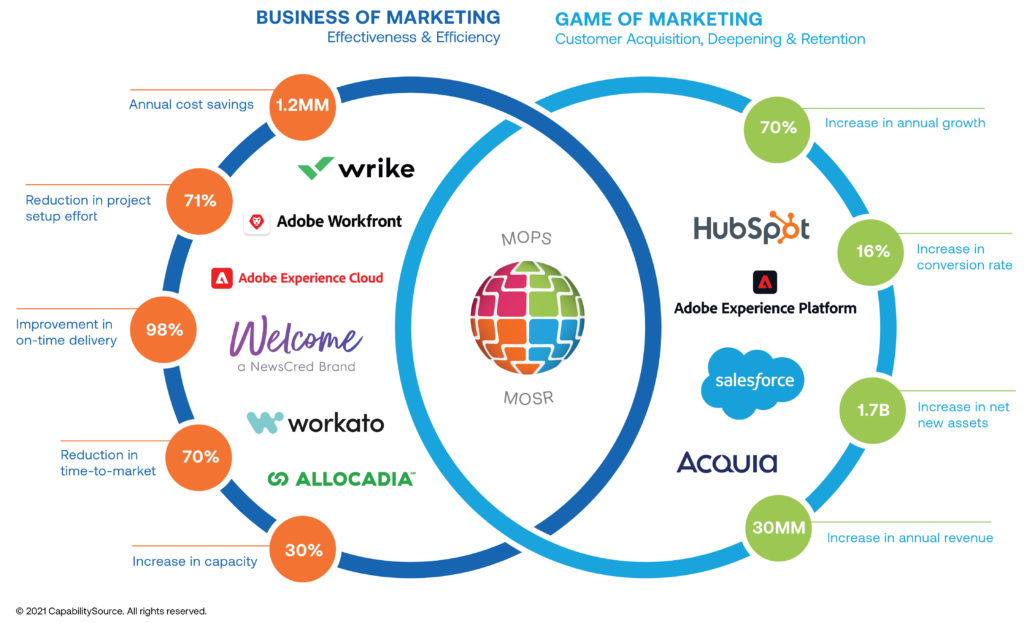The marketing landscape is rapidly transforming. Marketing operations is becoming a key focus for organizations trying to get through their digital transformation quickly and efficiently. CapabilitySource has worked with a large number of organizations to assist in their digital transformations, to redefine the importance of marketing operations and to develop a roadmap to navigate the changing technology landscape. We are redefining the meaning of marketing through two fundamental lenses: the business lens and the game lens.
What Is the Business of Marketing?
The creative side of marketing is where marketers find themselves most drawn to and where they spend the majority of their resources. And why wouldn’t they? Marketing is a way for organizations to tell their story through photos, blogs and videos with a creative flare. It is fun to focus on the colorful world of creative content and lose focus on the business aspects like budgeting, strategy, collaboration, processes and workflow.
A good way to think about this concept is to think of professional sports; for example, major league baseball. Athletes want to play the actual game of baseball and fans want to attend games and watch their favorite teams. However, playing and attending the game would not be possible without the business side of baseball. Where would the MLB be without investors, budgets, statistics, strategies, resources, staff management, recruiting, sponsorships and rules of the game?
It is the same with the business of marketing. For organizations to have successful marketing outcomes, executives must give adequate attention to the business concerns of marketing like capacity, budget, performance, analytics, workflow, governance, compliance and resource management. With an effective business strategy and plan, mid-size and large-size marketing teams can reduce their annual marketing costs while also reducing campaign cycle time and increasing capacity. They can produce higher-quality marketing, increase content reuse and accelerate content production, all by focusing on the business of marketing.

Business of Marketing Application
Now that you have a better understanding of the business of marketing vs. the game of marketing, how do you apply it to your company? Based on Gartner analysts’ research identifying 12 primary marketing operations responsibilities, CapabilitySource developed the 12 Marketing Operations Capability model that guides marketers to invest in targeted capability improvements, so they can get the best results at the lowest cost.
The model outlines the responsibilities of the marketing operations function that marketing executives sometimes struggle to define and staff because they don’t clearly understand what marketing operations is, what it does or how it works. In essence, they don’t clearly understand the business of marketing.
Marketing executives don’t always appreciate the value of the behind-the-scenes business aspect of marketing because it is only the support to the main event. But, without the business of marketing, there would be no main event.
Unfortunately, this lack of understanding often results in a chaotic and inefficient marketing process where great marketing strategy does not translate into great execution. The way to fix this type of gap is with marketing operations.
Outline the specific roles and responsibilities of each person on the marketing team. Then standardize and automate end-to-end marketing process. This produces clarity and accountability.
Marketers can produce the positive business outcomes they desire and reach their organization’s aggressive growth goals when they know what to focus on and how to manage work effectively.
Why Is the Business of Marketing Important?
Organizations are having to adjust their capabilities to respond to the more aggressive demands of changing consumer preferences, advancing digital technologies and growing competition. Marketers must be smarter, faster and better equipped than ever before, but without the resources of the past.
Traditional year-over-year budget increases, reactive campaign strategy, long content production cycle times and single channel communications are history. Marketing teams must be fast, agile and nimble while remaining creative. This requires a new type of planning, coordination and automation; it requires a focus on business concerns and not just creative communication.
This is why the business vs. the game of marketing model is so instrumental to marketers today. It helps marketing leaders and their teams balance business concerns with creative and communication challenges to produce the best possible outcome. Excellence in infrastructure, processes, budgeting, tracking metrics – although not as full of color and flare – are all essential. A greater business focus prepares and equips marketers to tell their story and win the game of marketing. Neither side is more important than the other. Marketing teams can balance efficiency and effectiveness while also deepening relationships, improving acquisition rates and retaining existing customers.
With a stronger business foundation, marketers can spend more of their time being creative and telling their story. To play the game, you need to run the business.
See Also:





